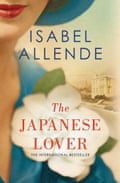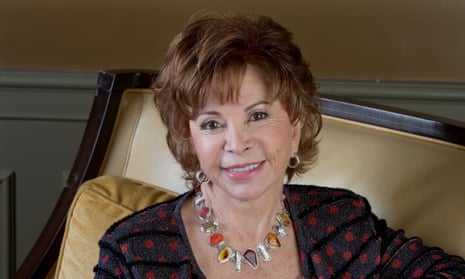For almost three decades Isabel Allende enjoyed a blessing that often eluded the characters in her books: a sense of home and enduring love. She found sanctuary in a picturesque niche of California and in the arms of an adoring American husband, William Gordon. Not a bad way to spend your autumn years after a life marked by uprooting and loss.
But as the Chilean writer curls up in an oversized hotel armchair in Los Angeles, she detonates a small bomb under the notion of happy-ever-after. “A year ago I would have said home is where my love is,” she says, in grammatically flawless, accented English. “But now that I don’t have a love I don’t know where home is.”
After 27 years of marriage and dozens of books exploring love, family and belonging, the 73-year-old author is now single and living alone in her house outside San Francisco.
She does not want sympathy. “Don’t give me your condolences because it has been really good to end that marriage. We never slammed the door or screamed at each other. There was no third person involved. It just died a natural death.”
The tone is philosophical and matter-of-fact. Having experienced abandonment, exile, grief, fame and fortune – more than 65m books sold – Allende seems ready to embrace a new, unexpected chapter in a remarkable life. “It’s weird to come home and all the lights are off, and it’s silent, and cold. It’s strange not to have another presence, the bulk of another body. But I’ll get used to it.”

Chic in black boots and skirt and embroidered jacket, Allende is at the tail-end of a two-month European and US tour to promote her latest book, The Japanese Lover. A multigenerational epic of love lost and found, it sweeps from present-day San Francisco to the Nazi invasion of Poland to Pearl Harbor and the herding of people of Japanese descent into US internment camps. She wrote it as her marriage to Gordon crumbled, freighting the story with a painful acceptance that few experience true, lasting love.
Mega-bestsellers such as Inés of My Soul, City of the Beasts and Paula, a memoir about her daughter who died in 1992 after a porphyria-induced coma, have proven Allende’s ability to plumb the human heart, and channel narratives flecked with magical realism. Her devotees write to her in droves, sharing their own stories and seeking counsel.
Between sips of tea, Allende is affable and energetic as she discusses her tumultuous life odyssey. Abandoned by her father at the age of three, she moved around South America with her mother and stepfather, a Chilean diplomat, before the family returned to Santiago. After Augusto Pinochet toppled Salvador Allende in a bloody 1973 coup, the young Isabel, a first cousin once removed of the fallen president, fled to exile in Venezuela. There she pursued journalism, separated from her first husband and wrote her debut novel, The House of the Spirits, inspired by memories of her grandfather’s house.
By the time Allende settled with Gordon in California in 1989 she was on her way to becoming one of the world’s most widely read Spanish-language authors; an award-winning phenomenon, her books were translated into more than 30 languages. She advised Gordon, a lawyer-turned-novelist, on his writing, and soaked up the beauty of Marin county. Gordon’s three adult children from a previous relationship were drug addicts, however, and two died from overdoses.
“When his youngest son died three years ago he just lost interest in everything. He went inward and cut everybody off, me included. It’s very sad. Fate has given him very hard blows. Between him and me, we have lost three children. Very few couples survive the death of one child, let alone three.”
She tried to save the marriage. “Therapy, antidepressants, you name it, and it didn’t work. One person cannot save it. This is something we should have done together.”
It takes more courage to stay in a dead relationship than abandon it, she says. “To leave you confront loneliness, and you’re scared for a while, and then you get over it.” The idea of enduring love still appeals, however. “I just wish it would have happened to me. I have known couples like that – that have aged together, bonded in wonderful ways. I think it’s possible.”

It was easier in the old days. “But now people live too long so we have 20 more years to make mistakes,” she smiles. Does she expect to find love again? A pause, then a laugh. “Maybe not in a marriage, but with a lover.”
She poured feelings of loneliness into the new novel. “I was asking myself the question how would my old age be. Because I’ve never lived alone before.” Allende shudders at mention of dating apps such as Tinder. “No, unfortunately I can’t do that. I belong to a generation where that was not done.” Allende stresses that she is not isolated: her son and daughter-in-law live nearby, as do friends.
Allende became a US citizen in 1993, received the presidential medal of freedom at a White House ceremony last year and expects to die in California, but she does not feel like a gringa. Her sense of self lies south. “The theme of displacement is very natural for me. It always comes up in my books because I have been a foreigner all my life and I don’t feel I belong anywhere. I’m an immigrant.”
The eruption of xenophobia in US politics deeply worries her. The Virginia mayor (a Democrat) who invoked Japanese internment camps in opposing a welcome for Syrian refugees was bad enough, but Donald Trump, the Republican presidential frontrunner, is truly dangerous, she says. “He’s a raging lunatic. And he has this following. He may destroy the Republican party. This seems funny and grotesque but it is very scary because this is how the Nazi movement started. No one took it seriously. We think it’ll never happen here. It might.”
Allende also criticises leftwing governments in South America and believes Cristina Kirchner’s blunders in Argentina allowed a conservative to win October’s presidential election. “You could see it coming because the corruption and inefficiency of the Kirchner government was appalling.” Venezuela, facing legislative elections on 6 December, is even worse off. “The stories I hear from my friends and family – it’s of a country that has collapsed economically and politically. All the natural resources you could imagine, plus oil, and they have managed to collapse the economy.”

Allende reads news on her phone in the mornings, then spends six to eight hours at the computer, clocking off several hours earlier than she used to. “It’s hard to pull myself away from the writing but I need to have a life.” Rather than structure plots in advance, her method is to plunge in with the barest sketch of a character and let the story evolve organically, a self-confessed meandering, trial-and-error process. “I just tell the story as it comes.”
Despite her productivity and success, nerves used to plague Allende. Only “very recently” has she become confident. “Now I realise that I can tell a story, that I have the skill and training and experience.” She is a surprising champion of certain television dramas. “The best storytelling is those series on TV,” she says, referencing shows such as Breaking Bad, Game of Thrones and Ray Donovan. “They’re wonderful. The sense of suspense, how they catch you by the neck and don’t let you go.”
Since she started living alone, however, Allende spends her evenings reading, ignoring the television. It is not an artistic decision. She shrugs and smiles. “I don’t know how to turn it on.”

Comments (…)
Sign in or create your Guardian account to join the discussion